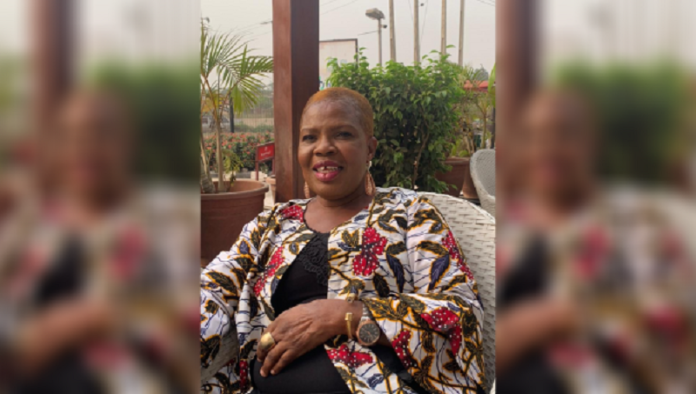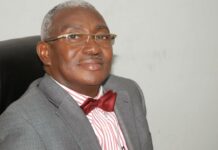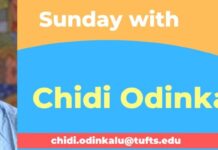By Jeph Ajobaju, Chief Copy Editor
A Nigerian-American says she is escaping back to the United States after she saw horror unleashed by armed Fulani herdsmen who beheaded neighbouring farmers and destroyed crops on her own farms in Ibaayin village, Ibadan, Oyo State in which she invested N20 million.
The invading assassins rampaged unchecked. They took away the heads of the victims.
Villagers watched helplessly from afar as the murderers also herded their cattle to gobble up crops from farm to farm, and to defecate in and pollute the two main rivers from which the community fetched drinking water.
After living for more than 30 years in the U.S., Olajumoke Awosika returned to Nigeria in 2010, settled in Lagos and bought three separate plots of land around her maternal ancestral village in Ibaayin for commercial organic farming
She dug in for the long term. Her optimism was infectious.
Fellow Diasporans, some of them relatives and friends living in Europe and America, asked her to help them acquire acres of farmlands in Nigeria – and were planning to return home to help the country produce more food.
Awosika said she was not expecting huge profit until 25 years after she first tilled the soil. She hired a farm manager and four other workers and paid each N300,000 per year. She sank an industrial borehole to get water for both workers and crops.
After five years of toil, and as a new batch of the first fruits of plantain and tomatoes were about to be harvested, the herdsmen struck and wiped out N1.5 million worth of harvest. And they came in broad daylight. (Her full story is recounted further below).
TheNiche published on February 17, 2021 the story of other wealthy Nigerians buying citizenship overseas as Plan B against uncertainties at home, per reporting by AlJazeera.
Myetti Allah sponsors killer herdsmen, says Ortom
Awosika scurried off back to safety in Lagos on February 27.
Then news broke on March 21of how another band of herdsmen attacked and nearly killed Benue State Governor, Samuel Ortom, on his way back from his farm near Tyo-mu along Makurdi-Gboko Highway the previous day.
Ortom said at a press conference in Makurdi on March 21 that the herdsmen sought and are still seeking to kill him at the behest of Miyetti Allah because of his stand against the herdsmen who commit murder with impunity.
He disclosed that Miyetti Allah, a group he described as one of the sponsors of the herdsmen, held a meeting in Yola in 2016 and earlier this month “where they decided that they will take Nigeria and that every other person is a slave; that was when they started infiltrating the entire country.
“They came out with a statement singling me out as the only person who is creating problem for the entire Fulani race.”
Fulani herdsmen from the North East and North West have long occupied villages in parts of Benue in the North Central. They kill many on their ancestral land and drive out others into miserable conditions in internally displaced camps (IDPs).
Echoes of Ahmadu Bello
Miyetti Allah echoes the boast by Ahmadu Bello six decades ago to Islamise Nigeria from the Sahara to the Atlantic. Bello, then premier of the Northern Region, did not succeed in his mission.
But his offsprings are doing his wish, supported overtly or covertly by other Fulani supremacists, including President Muhammadu Buhari. As a result, Nigeria is bursting at the seams, and warlords are carving out ethnic enclaves for themselves.
Buhari, despite outrage North and South, has done nothing to prosecute or restrain the herdsmen who come up with arms against land owners wherever they set foot in.
Instead, he sends out fellow Fulani bigots to defend the murderers who also brazenly abduct school children in the North for ransom. One of his emissaries, Ahmad Gumi, an Islamic cleric, insists the criminals are aggrieved and need to be appeased.
Insecurity fuels Southern separatist clamour
This has never been a truly united country since the British amalgamated the Northern and Southern sections of the River Niger in 1914 and named the contrivance ‘Nigeria’ (coined from ‘Niger area’ by the wife of Frederick Lugard, the then governor general).
Lack of law enforcement and justice administration both became more emboldened from independence in 1960 on the fulcrum of massive corruption, and cover up, at the federal centre of power – a structure Northerners always manipulate to dominate.
In the 60 years since independence, the North has ruled 43 years, the South 17 years.
Incompetent federal leadership has led to demand in the South for separation or restructuring to ensure self governance and accountability at local level. But the elite in the North, which by all indices is poorer than the South, does not want secession.
Entrenched corruption in every segment of society, which Buhari does little to tackle, is frustrating enough. Insecurity stoked by Fulani herdsmen makes things worse.
Agitation by Niger Delta militants – who comprise multi ethnicities – in the Deep South continues to simmer even though the insurgents are now into making money by refining stolen crude oil instead of risking life and limb blowing up oil facilities.
In the South East, Nnamdi Kanu has rekindled the flame of Biafra which died with the end of the three-year secessionist war in 1970, taking millions of lives. His Indigenous Peoples of Biafra (IPOD) is banned by Buhari but gathers support in Igboland.
In the South West, the publication of the scary story of Awosika coincided with the declaration of Oduduwa Republic on March 19 by Sunday Igboho, another ethnic warlord who grew within the ranks of the Odua Peoples Congress (OPC).
OPC, a Yoruba agitation group, came into prominence in 1993 after Ibrahim Babangida (from the North Central), the then head of Nigeria’s military junta, annulled the presidential election won by Moshood Abiola (from the South West).
Abiola died in detention in 1998.
Igboho carved out Oduduwa Republic from Nigeria on paper and declared it along with the map of the new Yoruba country and its currency.
Agitation for Oduduwa Republic has support from some prominent Yoruba individuals, including Ayo Adebanjo; and groups, including Afenifere.
Fulani herdsmen invaded the home of Igboho’s mother in Igboho, Oyo State on March 21. One of them was apprehended. On March 23, the Nigerian army, whose commander in chief is Buhari, announced plans to go after him and other separatist activists.
Awosika says insecurity in Nigeria is out of control and she is going back to the U.S. Her full story, published by The PUNCH, is reproduced below with slight editing for house style.
Her ordeal
Olajumoke Awosika is the Chief Executive Officer of Fresh Fields Organic Farms in Ibaayin village, Ibadan, Oyo State. In this interview with KAYODE OYERO, the 57-year-old United States returnee narrates her ordeal at the hands of herdsmen, whose incessant attacks forced her to abandon her N20 million farm
What is your name and what do you do for a living?
My name is Mrs. Olajumoke Awosika. I am 57 years old. I’m an organic farmer, an organic instructor and organic teacher. I’ve been farming now for five years in Ibaayin village in Ibadan.
What is the size of your farm and what kind of crops do you cultivate?
I have three farms but the one in question is about 10 acres, which is four hectares. I planted plantain mainly but I also have palm trees, ginger, turmeric, yam, pineapple, cassava, tomato and pepper on the farm.
What motivated you to venture into farming?
I’m a US-trained caterer. I am a caterer by profession; that was what I was into in America before I came back to Nigeria. I worked at Mobil Restaurant in Houston, Texas. But I took the option of early retirement.
When I came back home to Nigeria, with my husband, we decided to see what we could do. While abroad, we were hearing good things about Nigeria, that Nigeria was getting better.
By the grace of God, I’m a dual citizen of the United States of America and Nigeria. All my children were born abroad. But no matter how long you stay outside, home is still home; and that was why we came back home.
When we got back, I discovered that we don’t really have organic produce (in Nigeria).
I had been diagnosed with high blood pressure and diabetes and I was trying to live a healthier life. So, I was looking for organic produce, which I used to get in the US. But to my surprise, five years ago, that wasn’t really available in Nigeria and where we managed to get, it was really expensive.
I live in Lagos on three plots of land, so, I started using one plot of land for organic gardening. But with time, we began to get more produce than the family could consume, so, I started looking for market for the organic produce. I soon began to supply upscale supermarkets on the Island.
And that was when I discovered my passion and love for organic farming, when I realised that I could actually make money from it. As a result of that, I decided to get land in our family area in Ibaayin village, since my mother is from Ibadan. I got 10 acres of land there and that was how my journey into full-time farming began.
What year did you return to Nigeria?
I returned home in 2010.
How much money did you invest when you started the farm?
Organic farming is cash intensive. I spent about N4 million to get the four hectares of land. It was an outright purchase. I had immersed myself in learning about organic farming. I went for training here in Nigeria, in addition to the training I had had back in the U.S.
I discovered that in organic farming, you don’t use a bulldozer, you don’t use a caterpillar because that will strip and destroy your ecosystem, you will kill the earthworms, you will destroy what they call the uppermost soil and you will be left with another layer of soil which is not as rich as your top soil.
So, I decided that I was not going to use caterpillar. If I was going to use a caterpillar, it would have just cost me about N10,000 to clear each acre of land. That is very easy and cheap but very destructive.
So, instead of using caterpillar, I had to hire people to gradually clear the land, which was a virgin land, and get it ready for the planting.
I got four workers and paid each of them N300,000 per year. That was N1.2 million and it did not include the cost of feeding the workers. Later, we employed over 20 more labourers to join them.
In the end, I spent over N7 million on clearing the land. After that, I spent N1 million to sink an industrial borehole.
So, how much have you invested in the farm in total since you started?
I have spent over N20 million, including the cost of the land.
Have you started recouping your investment and making profit from the farm?
Farming is not like buying and selling where after selling a container, you can go back to America or China to import another. It’s not like that. The N20 million that I have invested so far, it is probably going to take me the rest of my life before I start making profit, probably like 20 years from now.
It’s a long-term investment; it is my retirement investment but I had to look for something that would give me money in the short term. And that was why I started planting tomatoes, pepper, vegetables which we can still plant in between the trees.
But in the next 10 years, we won’t be able to plant in between the trees again because by then the hands of our plantain and palm trees would have created shade and nothing will thrive under shade.
I pay my workers with money from the short-term crops. I had expected that this year I would break even and start getting money, to the tune of millions, from the farm, but crisis started and shattered everything.
What really happened that made you abandon your farm and leave Ibadan?
When the Sunday Igboho phenomenon happened and he gave the Fulani herders an ultimatum to leave the Ibarapa axis, we saw a gradual increase in the population of Fulani (in our area), which was unlike anything we had seen in the last five years.
Before then, I had never seen one Fulani cow in my axis (Ibaayin) because my farm is remote. When we started seeing them, my farm manager told me about it. He is the head of a task force organised by farmers in the area and he had had many encounters with Fulani herdsmen; he had fought with many of them.
When the situation got heated and they (herders) started kidnapping people, I stopped going to the farm alone. I went with my farm manager and he showed me tracks of cows. He later told me they had already invaded nearby farms.
I am the biggest plantain farmer in the area. The first day they (herders) came to the area, they destroyed farms. This was on February 10, 2021. As soon as they (herdsmen) got there, they went into people’s farms, harvested their plantains and uprooted cassava for their cows.
Those were farms around mine, owned by old men, people in their 60s and 70s and the herdsmen destroyed the farms on a massive scale. The cows ate the crops after which they were marched by the herdsmen to the two main rivers in the village – these were rivers with very clear and clean water that the villagers drank.
The herders destroyed the water completely; their cows defecated and polluted the water. So, the villagers started fetching water from the borehole in my farm.
Do you mean your own farm was spared on that occasion?
Yes, but the only reason they didn’t enter into my farm that day was because there were four boys on the farm. They were able to enter into other farms and wreaked havoc because nobody was on those farms.
What was the reaction of the farm owners after the destruction by cows?
The villagers held a meeting. The farmers’ task force traced the cows to a certain Fulani man, who had acquired about 200 acres of land in the area. Some villagers around us sold 200 acres of land to that Fulani man. So, the task force discovered it was that Fulani man that freed his cows to graze on other people’s farms.
But with 200 acres of land, how can you tell me there is nothing for those cows to eat, so that they had to come outside to destroy people’s farms? Of course, it was just sheer wickedness.
So, after that invasion, the affected farmers went to confront this Fulani man and told him to build a ranch for his cows on his land or they would kill his cows but the man did not listen.
The second day, the villagers chased the herdsmen out of our village and we were happy, thanking God that that would be the end. But we were wrong. It turned out it was only a prelude to another horror.
What happened thereafter?
On February 27, Fulani men kidnapped the son of a poultry owner in Apete. The vigilantes and the villagers went after them, and the fleeing Fulani people entered Alajaka village and killed eight people; they entered Alaka village and killed more people, beheaded them and took their heads away.
That was the height of it and I said, “I’m done!”. I just packed my things and returned to Lagos because my children and everyone in the US had been pressuring me to leave. When I left the farm, I told my workers to leave too because I don’t want any of them to get killed by the herdsmen.
Have you or any of your workers gone back to the farm since then?
Gone where! We have left the farm. We abandoned the farm in February when the herders killed eight people around us. It was very close to my farm, it was a walking distance.
In fact, last week [which began on Sunday March 14], my manager told me the herders finally invaded the farm with their cows and fed my plantain to their cows.
The plantains were supposed to have been harvested in February; they were worth about N1.5 million. It is supposed to be continuous harvest.
Have you reported the incident to the police?
There is no police post in the village; the nearest one is located at Alabata, about three miles to my farm. The police are aware of the killings; the matter was reported but nothing has been done.
As someone who lived for more than 30 years in the US, what impression do you get from these incidents?
We have to tell ourselves the truth, what we have in the South West are not herders-farmers clashes; no farmer is fighting with the herders, farmers don’t have guns. These (herders) are armed militia with sophisticated guns.
What the armed Fulani men are trying to achieve is what I don’t know. I speak French very well and I listen to the videos of these herders, they are francophone, our borders are wide open for Fulani criminals to come and attack us in Nigeria.
It is surprising that Fulani herders publicly carry gun and some governors in the North are telling us that they need the guns to protect their cows. What is the value of a cow compared to the value of a human life? Why can’t I, as a farmer, also bear arms to protect myself and my farm?
I remember some years ago, the Buhari government said everyone should surrender their arms. We did, but the Fulani never did. It’s like they have an agenda. We surrendered our arms and as a farmer, I am now a sitting duck for attackers; I can be killed, I can be raped, I can be kidnapped for ransom.
In America where I lived for over three decades, if I don’t have a criminal record, I can bear arms. I can protect my life, it is in the [American] Constitution. Even in the Nigerian 1999 Constitution, I have a right to defend myself.
If a Fulani man is carrying AK-47, as a farmer I should also be able to a carry gun and stand up to defend myself. If I am licensed to carry a gun, I swear to God, I will arm those boys on my farm, we will not run and we will stand our ground and l will see the Fulani man that will say he wants to kill me on my own land!
If the government cannot defend us, we should have a right to defend ourselves. The way forward is self-defence and it is a shame on this government that human life has no value.
Have you applied for licence to bear firearms?
No, I have not and it was because the Buhari government said everybody should turn in their weapons, that it is illegal to have guns as a citizen. Even my farm manager, who used to have a licensed gun, surrendered it because of the new policy.
But if the government does not allow us to bear arms, it should allow Amotekun to bear arms.
Do you regret coming back to Nigeria from the US?
Yes, I do and as a matter of fact, I am making plans to go back to the US. I’m done! There is no point because we don’t know when the rising insecurity in the country is going to abate.
This militia keeps bringing in weapons daily and the government is silent. It is very painful to let go of everything especially with no support from the government.
Do you have friends back in America who were considering returning to Nigeria to go into farming like you?
In fact, I have people that I have already helped to buy farmlands in Ibadan. One is an Ibadan man, who is well-known in Amsterdam; apart from him, there are other people like that in the US.
In fact, one of them wanted to go into cow ranching; that is his passion.
Is he Hausa?
No, he is mixed race, my childhood friend. As a matter of fact, I motivate a lot of Nigerians in the diaspora to invest in farming and so, today, whenever they hear of any tragedy, they all call me to check if I am safe.
But they are all encouraged to come and farm at home because they always say that if you can do this as a woman, then they can also do it. I’ve got farmlands for my sisters abroad and at least six others for farming.













